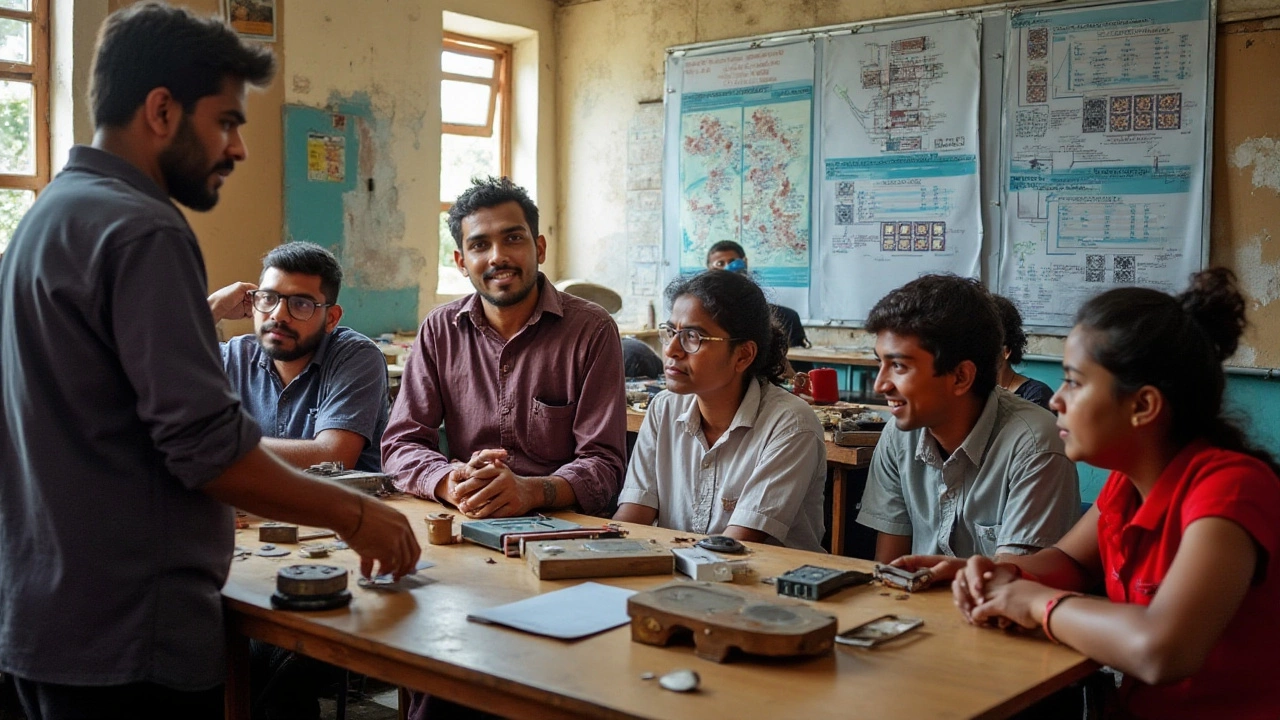Do People Still Rely on Locksmiths in India?
The locksmith profession dates back centuries, yet it remains as crucial as ever in our modern world. Although technological advancements have introduced smart security solutions, the skills and expertise of locksmiths are still highly valued. In India, this trade combines tradition with innovation, offering exciting opportunities for those interested in security and craftsmanship.
Aspiring locksmiths in India undergo specialized training to equip themselves with the knowledge needed to tackle both mechanical and electronic security systems. This education is essential, not merely for solving lock-related issues but for understanding the broader context of home and business security.
Choosing the right locksmith can be daunting, especially given the importance of keeping your property secure. It requires trust, experience, and credentials, which makes the selection process crucial for anyone seeking such services.
Looking ahead, the locksmith profession is poised to evolve alongside burgeoning technological trends. As security needs shift and new tools become available, locksmiths will continue to adapt, ensuring that our locks—and our peace of mind—are in capable hands.
- The Evolving Role of Locksmiths
- Locksmith Training in India
- Choosing the Right Locksmith
- The Future of Locksmithing
The Evolving Role of Locksmiths
Once upon a time, locksmithing was a trade steeped in mystery and manual dexterity, relying heavily on the craft of shaping metal to forge keys and locks. Fast forward to today, where the role of locksmiths has transcended the simple mechanics of unlocking a door. In the intricate tapestry of modern security, locksmiths are not just artisans with tools; they are now strategic partners in crime prevention. With the rise of smart technology and automated systems, locksmiths find themselves at the cutting edge, merging traditional skills with new-age tech-savviness.
In today's digital age, locksmiths must be knowledgeable about both physical locks and digital security systems, making them indispensable when it comes to securing assets. With gadgets like smartphones and keyless entries becoming the norm, locksmiths must adapt and evolve, understanding how these systems work and how they can be installed or repaired safely and efficiently. As such, the demand for locksmith services has not diminished; it has merely shifted towards more specialized and diversified functions. According to a report by Forbes, the global smart lock market is expected to grow significantly, highlighting the expanding scope of what locksmiths need to be prepared to handle in the future.
The diversification of locksmith services and the increased demand for comprehensive security solutions have made the field more exciting and challenging than ever before. Locksmiths today are called upon for an array of tasks that extend beyond simply unlocking doors. They install and repair sophisticated security systems, offer consultancy on security solutions, and sometimes act as investigators to understand how unauthorized access occurs. With cities becoming more crowded and technology becoming more advanced, locksmiths in urban areas especially have seen an increase in demand for their expertise, pivoting to cover everything from residential security to complex commercial systems.
Locksmith training has had to expand too, preparing individuals not just for lock-related emergencies, but also for the installation of advanced security systems that often require a solid grasp of electronics and network fundamentals. A seasoned locksmith now needs to stay abreast of the latest developments in the field, including updates in security legislation and the advent of new tech-driven solutions. As technology transforms, locksmiths are increasingly involved in discussions about cybersecurity, voicing insights on potential vulnerabilities in new technologies. They are also actively engaged in disaster response planning, helping create secure escape plans and ensuring that emergency exit paths meet current safety standards.
"Locksmiths have become the custodians of security, needing to understand a customer's unique requirements and providing tailored solutions that encompass both traditional and modern methodologies." - A leading industry expert.
Locksmithing as a career in India offers an enticing blend of traditional skills and cutting-edge technology, requiring ongoing learning and adaptability. In this land rich in culture and diversity, where historical sites and modern skyscrapers often coexist, locksmiths are called upon to innovate continuously. Prospective locksmiths can benefit from a curriculum that not only emphasizes the importance of mechanical proficiency but also dives deep into the exciting world of digital security measures. The intersection of these fields presents opportunities to solve complex puzzles and develop robust solutions that keep people and their properties safe across varied environments and unique challenges.

Locksmith Training in India
Becoming a locksmith in India opens doors to a career that is both grounded in tradition and ripe with modern innovation. The training involved is comprehensive, covering various aspects from the basics of lock mechanics to advanced security systems. This field, though often overlooked, plays a vital role in ensuring safety and security in both urban and rural settings. Traditional locksmithing is an art, and the journey to mastering it starts with understanding the basic components of locks, how they work, and their history. Students are taught to decode the intricate designs of mechanical locks and the procedures for picking and repairing them. As part of the training, apprentices are introduced to an array of tools, learning their specific purposes and handling techniques to avoid damage to both locks and doors.Locksmith training is not just about manual skills; it also demands a keen analytical mind. Many courses now incorporate digital technology education, preparing trainees to manage automated and electronic lock systems. Trainees must stay abreast of technological advancements, as clients increasingly demand modern security solutions like smart locks and biometric systems. Institutions across India offer locksmith training programs, both as full-time courses and as part-time certifications for aspiring professionals. These programs vary in duration from a few weeks to several months, providing flexibility for individuals balancing other commitments.
"With the growth of smart cities in India, the locksmithing industry is evolving, demanding versatile skills," remarks a leading security consultant from a reputed training institution.
Typically, training facilities ensure that students are well-versed in customer service skills. Given the nature of locksmith work, which often involves direct interaction with clients, a locksmith must not only be knowledgeable but also trustworthy and personable. Practical workshops form a core component of the curriculum, better equipping trainees to handle real-world challenges.
Types of Courses Available
Courses are designed to cater to different skill levels, from novice to advanced. Basic courses focus on essential locksmith skills, introducing students to lock types, key duplication techniques, and basic repairs. Advanced courses might delve into specialized areas such as safe-cracking, advanced automotive locksmithing, and the installation of security systems. Some programs also offer modules on business practices, guiding students on how to establish their own businesses or pursue employment within larger security firms.
Graduates find themselves in various roles, including working independently or as part of security and maintenance teams. As the field continues to evolve, the continued demand for trained professionals suggests a prosperous future for those with the right skills and dedication. With the ongoing infrastructure development in India and the expansion of urban housing, the importance of well-trained locksmiths cannot be overstated. This ensures that they remain a critical part of any strategy aimed at maintaining security and peace of mind. The breadth and depth of locksmith training allow for a varied career path, whether focusing on residential security or expanding into commercial and automotive domains.
In essence, locksmith training in India is not just a battle against tumblers and keys; it is a stepping stone to securing livelihoods, personal assets, and more importantly, trust within the community.

Choosing the Right Locksmith
When it comes to safeguarding our homes, offices, and personal spaces, selecting the right locksmith is not just a decision, but an investment in security. The choice becomes even more critical considering the diversity of locks ranging from traditional key systems to advanced electronic and biometric ones. These days, locksmiths are not confined to merely breaking and fixing locks; they are experts in security systems and unexpected occurrences where their services might be needed. Therefore, to make an informed choice, it is essential to consider qualifications, experience, and reputation.
The first step in choosing a competent locksmith is verifying their credentials and experience. A certified locksmith should have undergone locksmith training from a recognized institution in India, ensuring they are well-versed in both traditional and modern locking systems. Experience matters immensely – a locksmith who has handled varied locking systems will likely manage unforeseen challenges better. Furthermore, professional affiliations, such as memberships in locksmith associations, can indicate a commitment to ethical practices and ongoing education.
Reputation is another crucial factor. Recommendations from friends, family, or colleagues who have used locksmith services can provide invaluable insights. Online reviews can further aid in this regard, but one should discern genuine reviews from potentially manipulated ones. A reputable locksmith will also provide you with a detailed estimate of costs for their services, helping you avoid hidden charges and giving you peace of mind about fair pricing. It's wise to ask for a breakdown of the charges to understand what you're paying for.
According to the Bureau of Labor Statistics, "Locksmiths and safe repairers, due to the growing need for licensed professionals, have brighter career prospects, particularly those who continue learning as new technologies emerge."This highlights the importance of continuous learning and skill enhancement, which is a hallmark of a reliable locksmith. The most trusted locksmiths not only hone their skills through regular training but also understand the importance of incorporating the latest technological advancements to enhance security solutions for their clients.
Moreover, when dealing with locksmiths, trust is paramount. You're granting these professionals access to your home or business security systems. Therefore, verifying their background through personal ID checks or even a company profile check is prudent. Asking for identification when they arrive is not just standard practice but recommended. Additionally, ensure the locksmith service you choose is bonded and insured – this ensures you're protected against any potential damage during repairs or installations.
In conclusion, the decision to hire a locksmith should be driven by careful consideration of several factors such as credentials, reputation, and trust. By taking these into account, you can ensure that your security is in committed and competent hands. The presence and evolution of locksmith services are vital, and choosing the right professional will influence your confidence in your personal and business security systems.

The Future of Locksmithing
The winds of change are unmistakably blowing through the locksmithing industry, transforming not only the tools and techniques used but also the very nature of the profession itself. With the rise of smart homes and increasingly sophisticated security systems, locksmiths face new challenges and opportunities. No longer confined to crafting keys and picking locks, the modern locksmith must be as much of a technologist as an artisan. This evolution is reshaping the locksmith services landscape in countries like India, where tradition meets innovation in exciting ways.
As digital security systems become the norm, locksmiths are required to retrain and upskill to keep pace with technological advancements. Training programs are incorporating modules on electronic locks and cybersecurity basics, turning locksmiths into tech-savvy security advisors. In many ways, locksmiths are now playing an integral role in consulting on comprehensive security solutions for both residential and commercial properties. It's a trend expected to continue, with some experts predicting that traditional mechanical skills will be complemented by digital expertise, enabling locksmiths to offer integrated security solutions that are both reliable and cutting-edge.
This shift towards digital and smart technologies doesn't mean the extinction of the traditional locksmith; rather, it heralds a convergence of skills. A great paradox of modern security is that as technology makes security solutions more sophisticated, it also creates vulnerabilities that a skilled locksmith is uniquely placed to address. Indeed, locksmiths with knowledge of smart systems are increasingly consulted on vulnerabilities that can affect digital locks or alarm systems, underscoring their enduring relevance in an age buzzing with innovation. In this context, the appeal of locksmithing in developing markets like India is broadening, opening up new employment avenues and spurring economic growth.
In India, where the art of locksmithing has been a respected tradition for generations, this modern shift presents both a challenge and an opportunity. Houses and businesses are increasingly adopting smart technologies, which in turn prompts the need for locksmiths who understand both old and new methods. Locksmith training programs in India are rapidly adapting to include coursework on smart systems and electronic security, ensuring that graduates are ready for the ever-evolving landscape of locksmith training. The intertwining of traditional expertise and new-age technology is helping to foster a new breed of locksmiths, who are not only technical experts but also cultural custodians of an ancient craft reinvented for the future.
As we step into this digitally-mastered future, consumers are equally tasked with understanding that the security of their homes cannot solely rest on technology. A sharp-eyed locksmith equipped with comprehensive knowledge remains invaluable. So, as technology weaves its way into the world of security, locksmiths are expected to rise to new heights of proficiency, ensuring that no matter how futuristic locks become, they are never beyond the grasp of trained human hands. In this ever-changing world, the key remains in the balance between human skill and technological advancement. It's a partnership as timeless as the lock and key itself.





